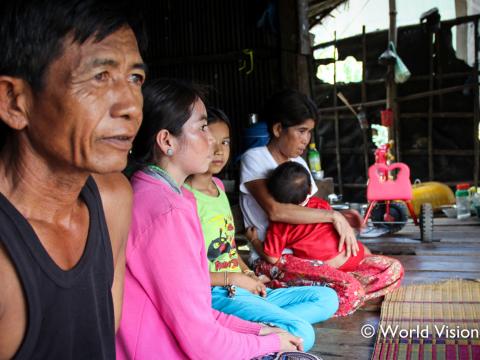Thai Undone

By: Lon Loeurt
The meagre earning from backbreaking work, harvesting rice and cassava under the sun, could not support Suoy’s family. Living with 7 children and two grandchildren, the 56-year-old and his wife, Sarann, do not own any cultivated lands, but sell their labour in the field in exchange for low paid income.
To earn some money during non-harvested season, Sarann and her daughter would wander through their village selling local snacks, which generated around 12 US dollars a day. Suoy and other family members sought casual work as construction workers.
Such unreliable incomes were not enough to put sufficient food on the table for the family. Suoy and his wife decided to uproot the family and move to Thailand in early 2014 in search of a better life.
“The most worrying thing was that we couldn’t make enough money to feed our children properly because we had to pay off our debts as well as buy rice,” Sarann explains.
Such illegal move was somewhat successful with eight of the extended family finding jobs as construction workers and each taking home 9.25 US dollars a day. However, not all of the family members found the move so easy.
One of his children, 12-year-old Srey Noy, was forced to drop out of school and look after her two younger siblings during the day. At night, she would collect junks used to do recycling to earn little extra cash for the family.
Six months have passed shortly for Suoy’s family when rumors spared within their fellow Cambodian migrants that Thailand junta was sending illegal migrants back to Cambodia. Their Thai bosses put pressure on them to stay, but with their safety potentially at risk, the family decided to head home.
Ordered out of the truck in Thailand’s southern Chon Buri province, the family had no option but to take a taxi ride, which cost over 90 US dollars, to the border. At the Thai-Cambodian border, a Cambodian government vehicle met them for the last part of the journey to their village.
The family arrived back home with just 340 US dollars, but without regular work in their village, they are considering returning to Thailand once more.
“We want the Cambodian and Thai authorities to sign a Memorandum of Understanding to fight the trafficking of people between the two countries,” says John Whan Yoon, Programme Manager for World Vision’s End Trafficking In Persons Programme.
“This will ensure that all migrants, especially those with vulnerable children, will not be victims of trafficking when they migrate to or from Thailand,” he adds.
World Vision will also train targeted groups in Cambodia in effective agricultural and vocational skills, as well as provide start-up capital to some of the most vulnerable returning families, so that those moving back can regain their sources of income.
As part of its Area Development Programmes, World Vision actively collaborates with local authorities and other community partners to raise awareness of safe migration and make sure returning children are safe and go back to school.
